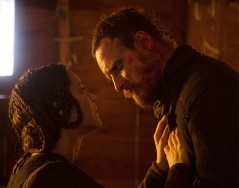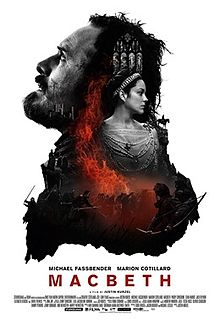No country for off-screen deaths
 I sometimes wonder what William Shakespeare would think of modern adaptations of his tragedies. Patrick Stewart in a random Soviet dystopia, Ed Harris running a leather-clad biker gang for some reason, etc. But then I remember that Shakespeare would probably be far more interested in seeing Bad Santa 2 or Office Christmas Party than a grimdark battle epic or a Michael Fassbender vehicle. Seriously. I dare you to find one work of Shakespeare that doesn’t contain a crude sexual innuendo.
I sometimes wonder what William Shakespeare would think of modern adaptations of his tragedies. Patrick Stewart in a random Soviet dystopia, Ed Harris running a leather-clad biker gang for some reason, etc. But then I remember that Shakespeare would probably be far more interested in seeing Bad Santa 2 or Office Christmas Party than a grimdark battle epic or a Michael Fassbender vehicle. Seriously. I dare you to find one work of Shakespeare that doesn’t contain a crude sexual innuendo.
Justin Kurzel’s version of the Scottish Play actually takes place in Scotland, which means OP out the window and inconsistent accents all over the place, but it strips away the self-awareness that so much of “filmed Shakespeare” has, and never do the characters wink at you, or otherwise seem like they know they’re in an adaptation. On the other hand, the filmmakers know that you know, so if you’re not thoroughly familiar with the story, expect to feel like an alienated party guest.
Macbeth (Fassbender), supporting King Duncan (David Thewlis) in the civil war, receives a prophecy before returning home: he is the Thane of Cawdor and the true king, while the sons of Banquo (Paddy Considine) are future kings. For context here: in the original text, the prophecy is spoken by three witches. In Shakespeare’s time and place, witches would have been considered the most evil, antagonistic characters imaginable, maybe next to the Devil himself, thanks to general ignorance and superstition. However, centuries later, when we can look at history more objectively (including the knowledge that “witches” were in fact healers, medicine women, and benevolent mediums), adaptation can serve old stories in intriguing ways. Here, the women Macbeth sees are never called witches, and the “Double, double, toil and trouble” scene, in which they reveal that they’re interfering only to cause mischief, is cut. So is Macbeth hallucinating, then? Has this toxic ambition been inside him all along? Later, Lady Macbeth (Marion Cotillard) sees the women as she wanders to an inevitable conclusion, muttering “to bed, to bed, to bed.” Do the women represent the spirits L.M. prays to once she is aware of the prophecy? Do they represent exactly the kind of power, albeit impartial, ambitious people call upon to achieve violent ends? Something to consider. It’s not every day a new Shakespeare film brings new questions with it.
Fassbender’s Macbeth is one of the most authentic on film. He’s used to playing complex characters full of internal conflict and despair, and isn’t afraid to embrace the side of Macbeth that isn’t the badass warrior we’re introduced to at the beginning. The character first becomes a cartoon of himself, his kingly clothing too large for his body, creating deceptions that only he thinks are clever, and in the end, he transforms further into a wretched, confused shell of a person, left with nothing but his instinct for fighting, and even that melts away in his final moments. You can see why it doesn’t take MacDuff (Sean Harris) and Malcolm (Jack Reynor) long to puzzle out what exactly happened to Duncan. And when the dust clears, no one’s sad that this mad dog didn’t get a chance to explain himself.
Marion Cotillard, while slightly underused, is the film’s foundation. Rather than portraying Lady Macbeth as “crazy,” which is easy, Cotillard’s scheming queen is instead increasingly plagued by depression (after losing a baby, which is hinted at in the original text), which later transmogrifies into guilt. It’s an incredibly layered performance that not only sets an interesting bar for this kind of character, but allows us to believe Lady Macbeth and her husband as a couple. The film gives us a look into their private relationship, and it becomes easy to believe that Macbeth would take her plan seriously. Subsequently seeing her with a “What have I done?” look on her face creates a portrait of a real person experiencing a staggering shift in control, rather than the borderline sexist caricature we often get.
The rest of the cast is appropriately unremarkable – not in their performances, of course, but part of the idea is that the rest of these people are just trying to live their lives and do their jobs, for the most part. Sean Harris’s MacDuff is notable for being the one who looks the most like a person from 5th-century Scotland might actually look, but my dark horse favorite is Elizabeth Debicki as Lady MacDuff. She doesn’t get much screen time, but the tear-and-mucus-filled mini-monologue she gives in the face of the rawest form of Macbeth’s madness is enough to make anyone step back and realize how unspeakably wrong this all is.
Due to the length of individual moments and monologues, combined with the film’s relatively short runtime (under two hours), the story feels a bit truncated. But it’s the power of those individual moments that keeps it afloat. The play’s most famous speeches – “Out, damned spot,” “Tomorrow and tomorrow and tomorrow,” and others – are captivating and meaningful even when you know they’re coming, because Kurzel’s characters weave them into moments that already exist, rather than creating moments around them. Cotillard and Fassbender practically whisper words that in other versions are expressed as booming, profound pontifications. No room for that here. Despite the film’s emphasis on battle scenes and violence (in a play where most, if not all, of the deaths take place offstage), everything feels intensely personal.
Maybe that’s the key going forward with Shakespeare adaptations on film: not trying to make them cool and different (i.e. looking at the macro, the outward, the exterior), but to turn inward and examine what we can get from these characters now.
 Macbeth (2015); directed by Justin Kurzel; starring Michael Fassbender, Marion Cotillard, Sean Harris, and Elizabeth Debicki.
Macbeth (2015); directed by Justin Kurzel; starring Michael Fassbender, Marion Cotillard, Sean Harris, and Elizabeth Debicki.
Leave a comment
No comments yet.

Leave a reply